Posted: April 19th, 2017 | Author: Sven | Filed under: EDaWaX, journals | Tags: data archives, Data Sharing, DOI, Linking Data and Publications | Comments Off on Managing research data using the ZBW Journal Data Archive

Yesterday, a new blog post has been published on ZBW Mediatalk in which I describe the history and the background of the EDaWaX-project that led to the development of the ZBW Journal Data Archive. The Journal Data Archive (JDA) is a service for editorial offices of journals in economics and partially also in the social sciences. Currently this service is free of charge and already two renowned journals are using our services productively.
The JDA offers direct linking between published research papers and the underlying data, that has been used to generate the findings of an article. The workflow is time-saving and easy to handle: Authors of a journal’s article submit their replication files to the system and describe these files with additional metadata. For us it was quite important to find a useful balance between the efforts a user has to invest to generate these additional metadata and the needs of our information systems. For the development of our metadata schema, we followed the motto ‘as much as necessary, as little as possible.’ Read the rest of this entry »
Posted: July 15th, 2015 | Author: Sven | Filed under: found on the net, journals | Tags: data archives, Data Policies, Data Sharing, publisher | Comments Off on Wiley partners with Figshare to enable data sharing

At the end of June,
Figshare (an online digital repository where researchers can preserve and share their research outputs, including figures, datasets, images, and videos) announced a partnership with the publishing house Wiley to support authors who wish to openly share their data.
The background of this partnership can be located in a rapidly evolving issue that is shaping the future of scholarly publishing: funder mandates increasily require academics to make all of the products of their research available in a similar way that they make their papers available.
Examples cover the National Science Foundation (
NSF) in the US (“
[The NSF] expects PIs to share with other researchers, at no more than incremental cost and within a reasonable time, the data, samples, physical collections and other supporting materials created or gathered in the course of the work“) and the
European Commission (“
Beneficiaries [of the Horizon2020 programme, the 8th European Research Framework Programme] must also aim to deposit […] the research data needed to validate the results presented in scientific publications“).
Read the rest of this entry »
Posted: March 1st, 2015 | Author: Sven | Filed under: Data Sharing | Tags: Data Sharing, incentives | Comments Off on Paper on the Incentives for Academic Data Sharing published: „What Drives Academic Sharing?“
 Benedikt Fecher, Sascha Friesike, and Marcel Hebing have published another paper presenting further results of their study concerning academic data sharing. Since data sharing enables researchers to verify results and to pursuit new research questions with “old” data, it is of particular importance for scientific progress.
Benedikt Fecher, Sascha Friesike, and Marcel Hebing have published another paper presenting further results of their study concerning academic data sharing. Since data sharing enables researchers to verify results and to pursuit new research questions with “old” data, it is of particular importance for scientific progress.
Fecher, Friesike, and Hebing conducted a systematic review of 98 scholarly papers as well as an empirical survey among 603 secondary data users. In order to explain the data sharing process from the primary researcher’s point of view, the authors introduce a conceptual framework based on the analyses. They divide the data sharing process into six descriptive categories: data donor, research organization, research community, norms, data infrastructure, and data recipients. Read the rest of this entry »
Posted: October 9th, 2014 | Author: Sven | Filed under: found on the net, Projects | Tags: academic publishing, Data Sharing, incentives, metrics | Comments Off on PLOS, CDL, and DataONE join forces to build incentives for data sharing
 The open access publisher PLOS (Public Library of Science), the University of California Curation Center at the California Digital Library, and DataONE announced the launch of a new project to develop data-level metrics. The project, titled “Making Data Count: Developing a Data Metrics Pilot” is funded by the National Science Foundation (NSF) in the US. The project will result in a suite of metrics that track and measure data use.
The open access publisher PLOS (Public Library of Science), the University of California Curation Center at the California Digital Library, and DataONE announced the launch of a new project to develop data-level metrics. The project, titled “Making Data Count: Developing a Data Metrics Pilot” is funded by the National Science Foundation (NSF) in the US. The project will result in a suite of metrics that track and measure data use.
The need for such a data metrics pilot is obvious: Sharing data is time consuming and researchers need incentives for undertaking the extra work. Metrics for data will provide feedback on data usage, views, and impact that will help encourage researchers to share their data. This project will explore and test the metrics needed to capture activity surrounding research data. Read the rest of this entry »
Posted: March 18th, 2014 | Author: Sven | Filed under: found on the net | Tags: access to data, Data Sharing, Linking Data and Publications | Comments Off on Mendeley and labfolder join forces to improve data linking and exchange
Mendeley, a desktop and web program for managing and sharing research papers recently announced a collaboration with labfolder – a Berlin-based startup. labfolder is a digital lab notebook which helps scientists to keep their notes and data organized. The linking of these two tools allows the citation and embedding of scientific literature into experimental raw data, and the exporting and sharing of experiment descriptions in Mendeley.
For those interested in labfolder, I embedded the product video below. (Sorry for the advertising. I only mention the collaboration, because it shows that data availability and interlinking data and publications gets increasingly important)
https://www.youtube.com/watch?feature=player_embedded&v=S8OCIBAfbTE
Posted: March 10th, 2014 | Author: Sven | Filed under: Data Sharing, Projects, Research Data | Tags: data repositories, Data Sharing, Datasets, DOI | Comments Off on Introducing datorium – a new Data Repository Service for the Social Sciences
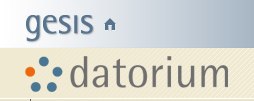 The current e-infrastructure for research data management in the field of social sciences in Germany has extended by an important component. Up to now, we faced a fragmented e-infrastructure for documenting, storing, hosting and curating research data in social sciences: On the one hand there are well-established research data centres e.g. for large household survey data. On the other hand appropriate research data infrastructure components for small and medium-sized research projects for instance were, with a few exceptions, almost not available yet. Read the rest of this entry »
The current e-infrastructure for research data management in the field of social sciences in Germany has extended by an important component. Up to now, we faced a fragmented e-infrastructure for documenting, storing, hosting and curating research data in social sciences: On the one hand there are well-established research data centres e.g. for large household survey data. On the other hand appropriate research data infrastructure components for small and medium-sized research projects for instance were, with a few exceptions, almost not available yet. Read the rest of this entry »
Posted: November 27th, 2013 | Author: Sven | Filed under: EDaWaX, Workshop | Tags: Data Policies, Data Sharing, pilot application, Replication | 1 Comment »
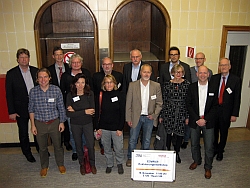 A week ago our project held its final evaluation workshop. We presented the main results of some of our work packages and also introduced a beta version of our pilot application for the management of publication-related research data in journals.
A week ago our project held its final evaluation workshop. We presented the main results of some of our work packages and also introduced a beta version of our pilot application for the management of publication-related research data in journals.
In preparation of the workshop we invited more than 30 editors of scholarly journals and almost a dozen scientists from 15 journals accepted our invitation. Read the rest of this entry »
Posted: October 29th, 2013 | Author: Sven | Filed under: Data Sharing, Report, Research Data | Tags: access to data, Data Sharing, European Commission, Open Data | Comments Off on European Commission held public Consultation on Open Research Data
 The European Commission (EC) held a public consultation on open research data. For that purpose the Commission invited stakeholders from various branches and researchers, the industry, funders, libraries, publishers, infrastructure developers and other stakeholders joined the meeting on 2 July in Brussels.
The European Commission (EC) held a public consultation on open research data. For that purpose the Commission invited stakeholders from various branches and researchers, the industry, funders, libraries, publishers, infrastructure developers and other stakeholders joined the meeting on 2 July in Brussels.
The commission posed five questions to structure the debate. These questions included basic questions like “how research data can be defined?”. But a lion’s share of the questions dealt with the “openness” of data: What types of data should be openly available? When and how does openness need to be limited?
In addition other important questions from the perspective of infrastructure service providers were mentioned. How should research data be stored and made accessible? How should the issue of data re-use be addressed? And finally a question I personally characterize as a very important topic: How can we enhance data awareness and a culture of data sharing?
Read the rest of this entry »
Posted: September 16th, 2013 | Author: Sven | Filed under: EDaWaX, Research Data | Tags: Data Sharing, economics | 2 Comments »
 Experts say research data management should be an integral part of university curricula
Experts say research data management should be an integral part of university curricula
Panel of experts recommends the integration of research data management into the university curricula of young researchers. The ZBW – Leibniz Information Centre for Economics and the German Data Forum initiated a debate on the topic at the annual meeting of the Verein für Socialpolitik, the most prestigious professional association of German-speaking economists, held in Düsseldorf from 4 to 7 September 2013. Read the rest of this entry »
Posted: July 29th, 2013 | Author: Sven | Filed under: found on the net, Workshop | Tags: Data Sharing, Guidelines | 1 Comment »
 Despite rising temperatures and beginning summer holidays all across Europe, the Open Economics Working Group of the Open Knowledge Foundation was very active within the last weeks. I would like to single out a few of these activities:
Despite rising temperatures and beginning summer holidays all across Europe, the Open Economics Working Group of the Open Knowledge Foundation was very active within the last weeks. I would like to single out a few of these activities:
Posted: July 8th, 2013 | Author: Sven | Filed under: Data Policy, Data Sharing, Projects | Tags: academic publishing, access to data, Citation, Data Policies, Data Sharing | 1 Comment »
 Today I want to introduce the PKP- Open Journal System / Dataverse Integration Project to our readers, an approach that is in some parts quite similar to our own approach in the field of economics.
Today I want to introduce the PKP- Open Journal System / Dataverse Integration Project to our readers, an approach that is in some parts quite similar to our own approach in the field of economics.
Funded by a $1 million Alfred P. Sloan Foundation grant, the OJS-DVN project intends to develop a plugin for journals that are using the Open Journal System (OJS), a journal management and publishing system that has been developed by the Public Knowledge Project (PKP), to expand and improve access to research. Read the rest of this entry »
Posted: April 18th, 2013 | Author: Sven | Filed under: found on the net | Tags: Data Sharing, economics, Linking Data and Publications | 1 Comment »
Yesterday several blogs, journals and news agencies spread the news: The US star economists Kenneth Rogoff and Carmen Reinhart are in trouble, because a paper of them -which had and has a considerable influence on worldwide economic policy- contains at least one serious error.
Their paper “Growth in a Time of Debt” was published in the flagship of economic research – the American Economic Review (AER) with also has a data availability policy that was evaluated in the course of our research project.
Important political assumptions and decisions were based on the research of Rogoff and Reinhart: Olli Rehm, European Commissioner for Economic and Monetary Affairs and the Euro and vice president of the European Commission and also the US-Republican Paul Ryan argued with the findings of Rogoff and Reinhart to justify austerity economics. Read the rest of this entry »
Posted: December 10th, 2012 | Author: Sven | Filed under: Data Policy, EDaWaX | Tags: academic publishing, Data Policies, Data Sharing, Linking Data and Publications | 1 Comment »
This article is cross-posted from the blog of the Open Economics Working Group
Background
 In Economics, as in many other research disciplines, there is a continuous increase in the number of papers where authors have collected their own research data or used external datasets. However, so far there have been few effective means of replicating the results of economic research within the framework of the corresponding article, of verifying them and making them available for repurposing or using in the support of the scholarly debate.
In Economics, as in many other research disciplines, there is a continuous increase in the number of papers where authors have collected their own research data or used external datasets. However, so far there have been few effective means of replicating the results of economic research within the framework of the corresponding article, of verifying them and making them available for repurposing or using in the support of the scholarly debate.
In the light of these findings B.D. McCullough pointed out: “Results published in economic journals are accepted at face value and rarely subjected to the independent verification that is the cornerstone of the scientific method. Most results published in economics journals cannot be subjected to verification, even in principle, because authors typically are not required to make their data and code available for verification.” (McCullough/McGeary/Harrison: “Lessons from the JMCB Archive”, 2006)
Harvard Professor Gary King also asked: “[I]f the empirical basis for an article or book cannot be reproduced, of what use to the discipline are its conclusions? What purpose does an article like this serve?” (King: “Replication, Replication” 1995). Therefore, the management of research data should be considered an important aspect of the economic profession.
Read the rest of this entry »
Posted: November 6th, 2012 | Author: Sven | Filed under: Conference, EDaWaX | Tags: Data Policies, Data Sharing, research paper | Comments Off on EDaWaX: First paper published! #Update
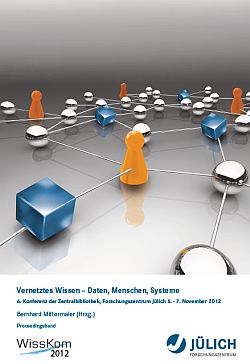 I am happy to announce that some of the results we obtained in our analyses have been published in the proceedings of the WissKom2012 conference (pp.29 ff).
I am happy to announce that some of the results we obtained in our analyses have been published in the proceedings of the WissKom2012 conference (pp.29 ff).
In the research paper for Wisskom2012 Olaf Siegert and I summarized some of the findings of the EDaWaX project. Unfortunately the paper is available in German only, but I promise to publish some more of our major findings in English – eighter on this blog or in a seperate paper. Some results of our analyses are already published here: ( |1 | 2 | 3 | 4 | )
The presentation I gave in Jülich is available in the download section of the blog.
I also wrote a paper in English that has already been accepted by a peer-reviewed journal. I hope to find time to rework the article and to integrate the very helpful notes and comments of the reviewers anytime soon.
I’ll come back to you, when I’ve got news.
# Update 2012-11-14 #
A slightly updated version of the paper is also available now. It has been published in Working Paper Series of the German Data Forum (RatSWD), No. 210. The RatSWD Working Papers series was launched at the end of 2007. Since 2009, the series has been publishing exclusively conceptual and historical works dealing with the organization of the German statistical infrastructure and research infrastructure in the social, behavioral, and economic sciences.
Posted: October 15th, 2012 | Author: Sven | Filed under: Conference, EDaWaX | Tags: Data Policies, Data Sharing, open access | 1 Comment »
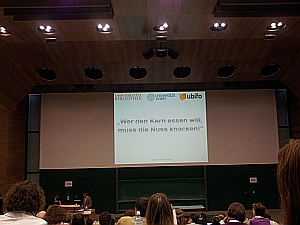 At the end of September, I was in beautifull Vienna for some days and presented a few results of our project at the 6th Open Access Days in a session about “Making Research Data publicly available: opportunities and challenges“.
At the end of September, I was in beautifull Vienna for some days and presented a few results of our project at the 6th Open Access Days in a session about “Making Research Data publicly available: opportunities and challenges“.
It’s been a very nice conference – and some blogposts [Uli Herb -> telepolis (in German) | Astrid Recker -> admtic (in English)] report on the conference and some of the presentations. My colleques Olaf Siegert, Ralf Flohr and I also wrote a summary of the conference for ZfBB (in German) that will be published in the next issue of the journal.
Well, to come back to my talk: In this post I want to point out some single aspects of my presentation: the availability of data policies in economic scholarly journals that are published open access.
Our project compared the number and quality of data policies we found in a sample of 43 open access Journals to a sample of 141 traditional subscription journals in regard to the implementation of data availability policies.
Generally speaking I wondered how open access journals acquit themselves in this context. Prior to starting our analysis I was quite sure that the percentage of journals equipped with a data availability policy would be higher in open access journals than the proportion of subscription journals equipped with such a policy. I even thought that open access journals could have a comparative advantage to traditional subscription journals: Read the rest of this entry »


 At the end of June,
At the end of June, 
 The open access publisher
The open access publisher  The current e-infrastructure for research data management in the field of social sciences in Germany has extended by an important component. Up to now, we faced a fragmented e-infrastructure for documenting, storing, hosting and curating research data in social sciences: On the one hand there are
The current e-infrastructure for research data management in the field of social sciences in Germany has extended by an important component. Up to now, we faced a fragmented e-infrastructure for documenting, storing, hosting and curating research data in social sciences: On the one hand there are 
 The European Commission (EC) held a public consultation on open research data. For that purpose the Commission invited stakeholders from various branches and researchers, the industry, funders, libraries, publishers, infrastructure developers and other stakeholders joined the meeting on 2 July in Brussels.
The European Commission (EC) held a public consultation on open research data. For that purpose the Commission invited stakeholders from various branches and researchers, the industry, funders, libraries, publishers, infrastructure developers and other stakeholders joined the meeting on 2 July in Brussels. Experts say research data management should be an integral part of university curricula
Experts say research data management should be an integral part of university curricula Despite rising temperatures and beginning summer holidays all across Europe, the
Despite rising temperatures and beginning summer holidays all across Europe, the 
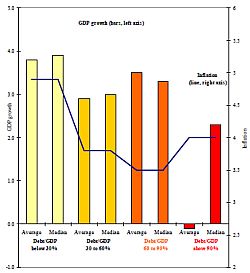
 In Economics, as in many other research disciplines, there is a continuous increase in the number of papers where authors have collected their own research data or used external datasets. However, so far there have been few effective means of replicating the results of economic research within the framework of the corresponding article, of verifying them and making them available for repurposing or using in the support of the scholarly debate.
In Economics, as in many other research disciplines, there is a continuous increase in the number of papers where authors have collected their own research data or used external datasets. However, so far there have been few effective means of replicating the results of economic research within the framework of the corresponding article, of verifying them and making them available for repurposing or using in the support of the scholarly debate. I am happy to announce that some of the results we obtained in our analyses have been published in the
I am happy to announce that some of the results we obtained in our analyses have been published in the 






